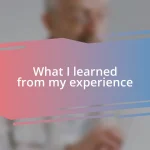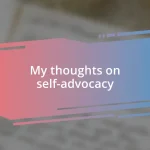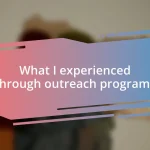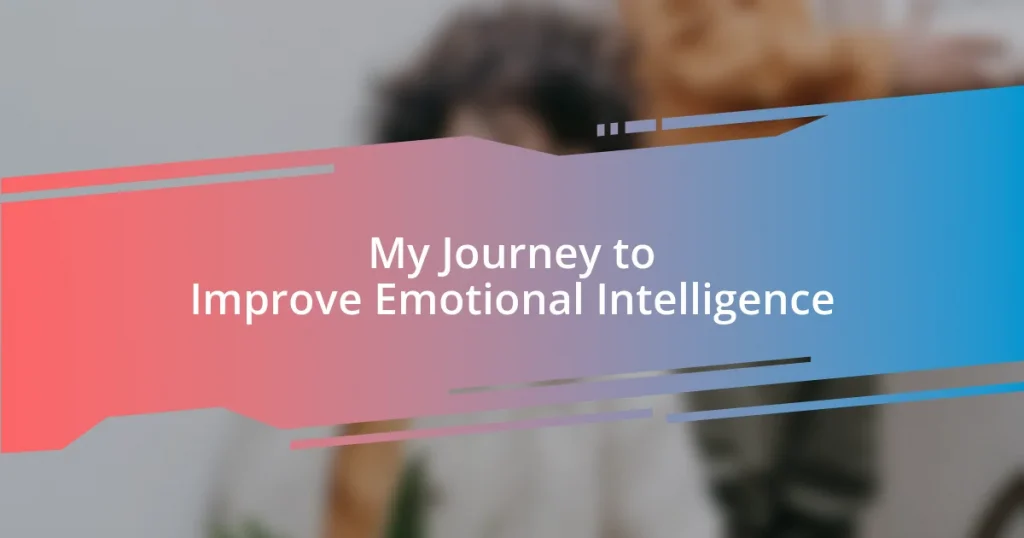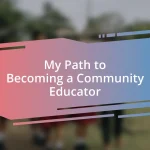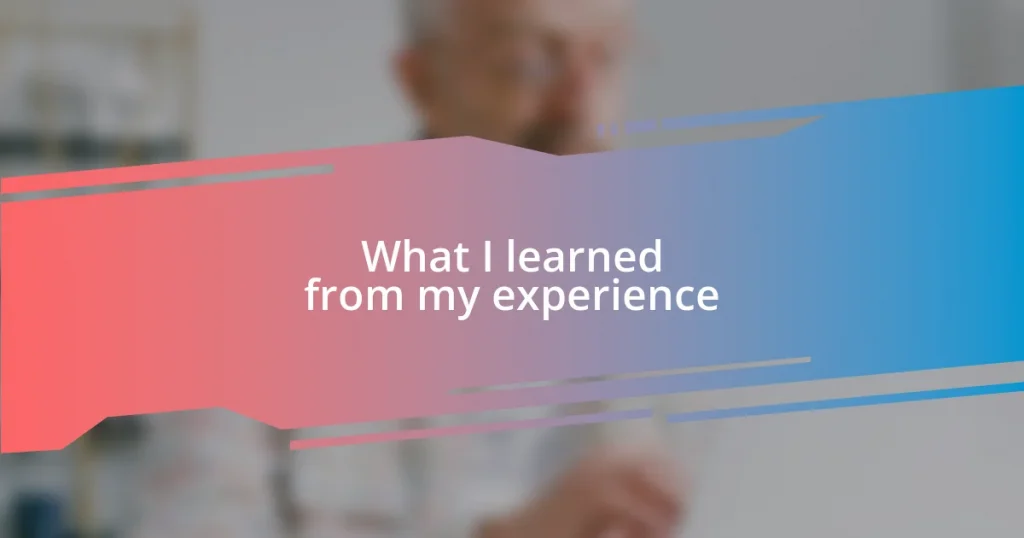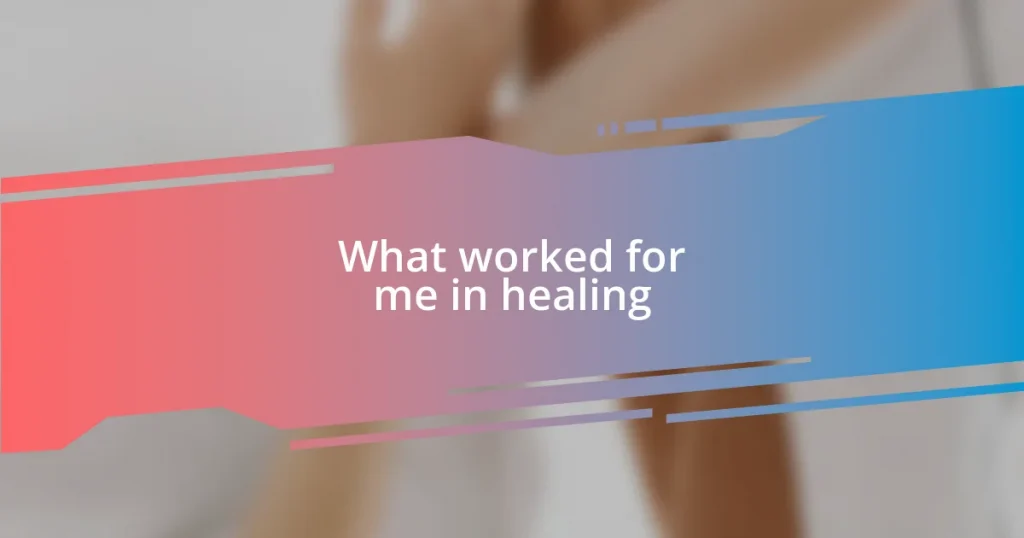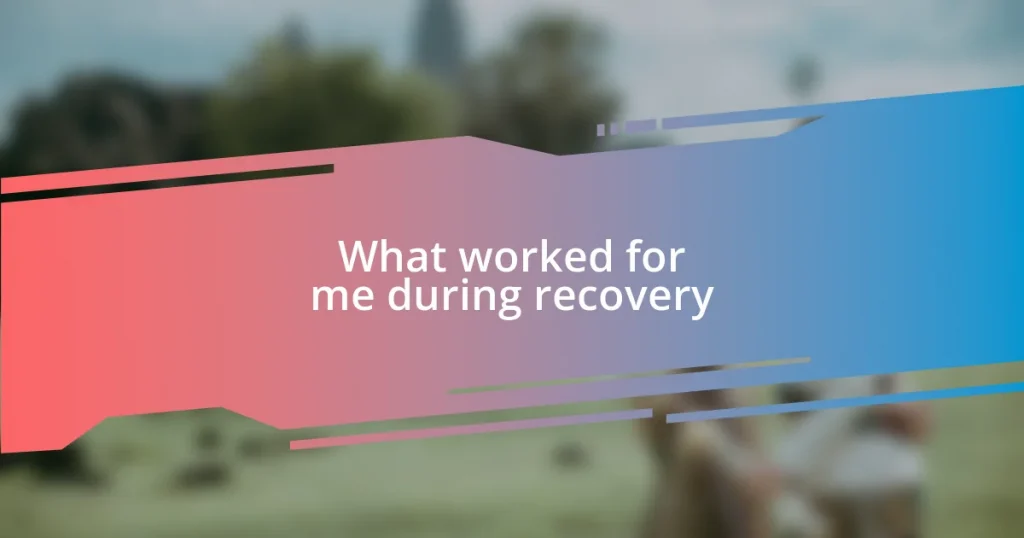Key takeaways:
- Emotional intelligence encompasses self-awareness, self-regulation, social awareness, and relationship management, significantly influencing interactions and conflict resolution.
- Regularly assessing emotional abilities through journaling and seeking feedback enhances self-awareness and helps identify patterns in emotional responses.
- Building strong relationships requires vulnerability, active listening, and establishing open communication to foster deeper connections with others.
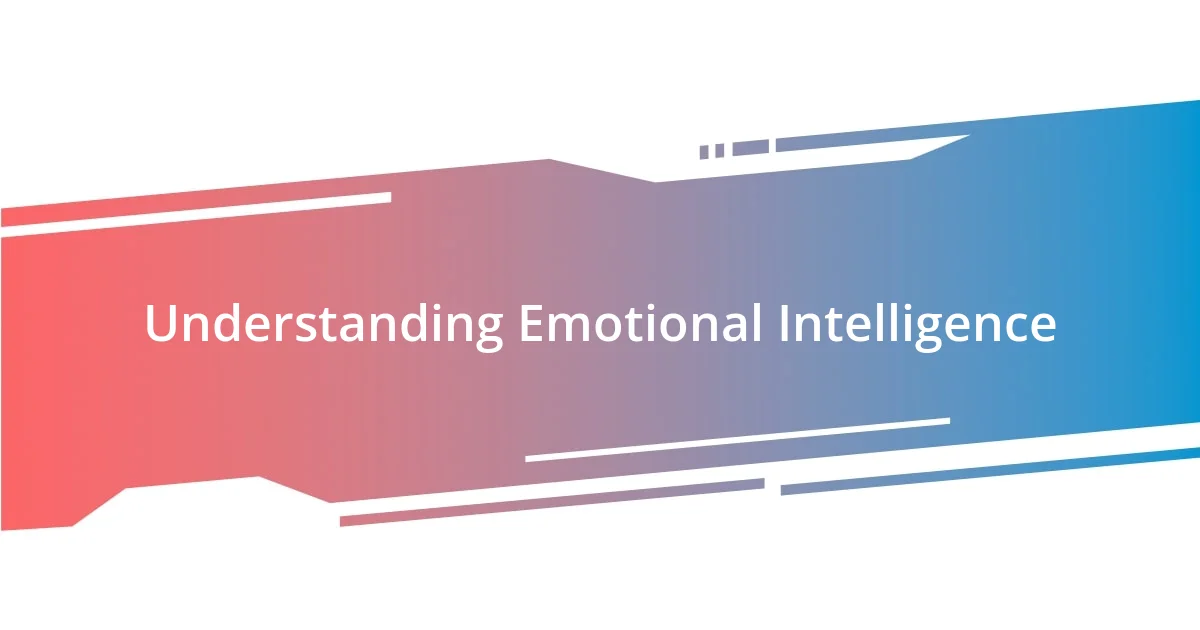
Understanding Emotional Intelligence
Emotional intelligence (EI) is essentially our ability to recognize, understand, and manage our own emotions while also being able to empathize with others. I remember a time when I had a heated discussion with a friend. Instead of letting frustration take over, I paused to acknowledge how I felt, which allowed me to respond more thoughtfully and avoid escalating the situation. Have you ever had a moment where taking a step back changed the outcome of an interaction?
At its core, EI involves four key components: self-awareness, self-regulation, social awareness, and relationship management. Self-awareness, for instance, involves being conscious of our emotional triggers. There was a period when I struggled with stress at work, and recognizing my feelings helped me communicate more effectively and foster better relationships with my colleagues. How does being aware of your emotions impact your daily interactions?
Developing emotional intelligence transforms how we navigate our relationships and challenges. I’ve witnessed the profound difference it makes in fostering connections and resolving conflicts. As I honed my EI skills, I found myself listening more deeply to others. It’s fascinating how a little emotional insight can create a ripple effect, isn’t it?
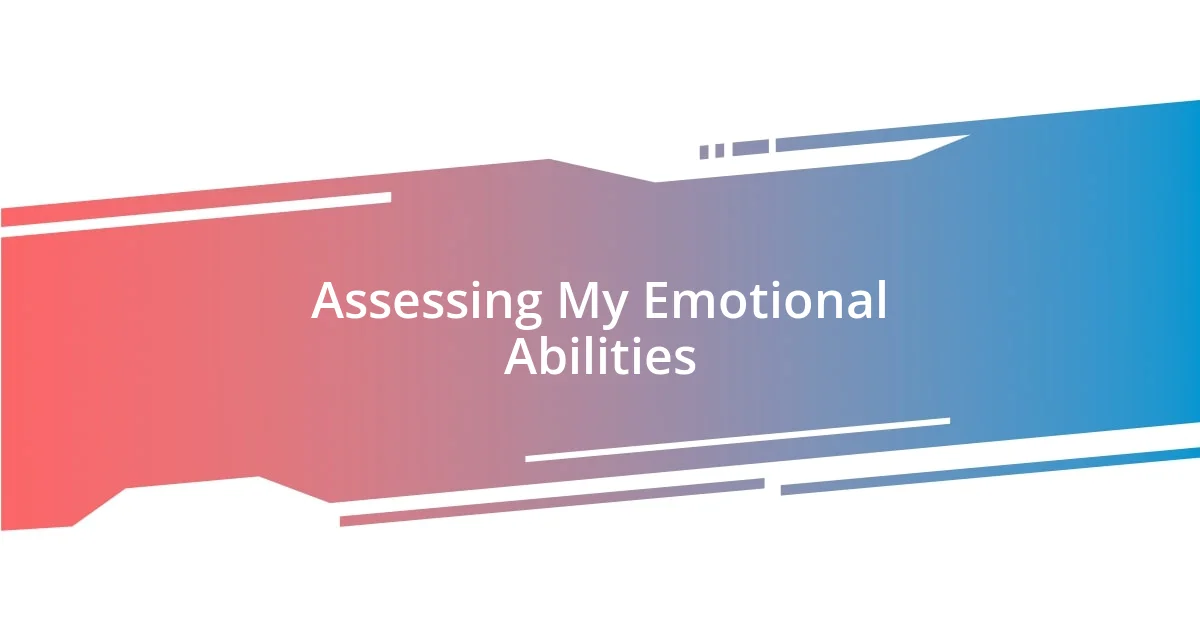
Assessing My Emotional Abilities
I’ve often found that assessing my emotional abilities isn’t just a passive reflection; it’s an active process that requires honesty with myself. When I first sat down to really think about my emotional responses, I was surprised by how often I neglected my feelings. I realized that keeping a journal for my emotions allowed me to spot patterns in my behavior and reactions—much like connecting the dots in a puzzle. This practice not only heightened my self-awareness but also helped me articulate my emotions more clearly.
- Reflect on recent emotional reactions to situations.
- Write down times I felt overwhelmed or stressed, noting triggers.
- Identify patterns in how I respond to conflicts or challenges.
- Consider feedback from trusted friends or family about my emotional responses.
- Use mindfulness techniques to observe my feelings in real-time.
By regularly assessing my emotional abilities, I discovered more about myself than I ever expected. It became an enlightening journey, revealing insights about my empathy and how I connect with others. Each assessment felt like unearthing a new layer of my emotional landscape, guiding me toward newfound understanding and growth.
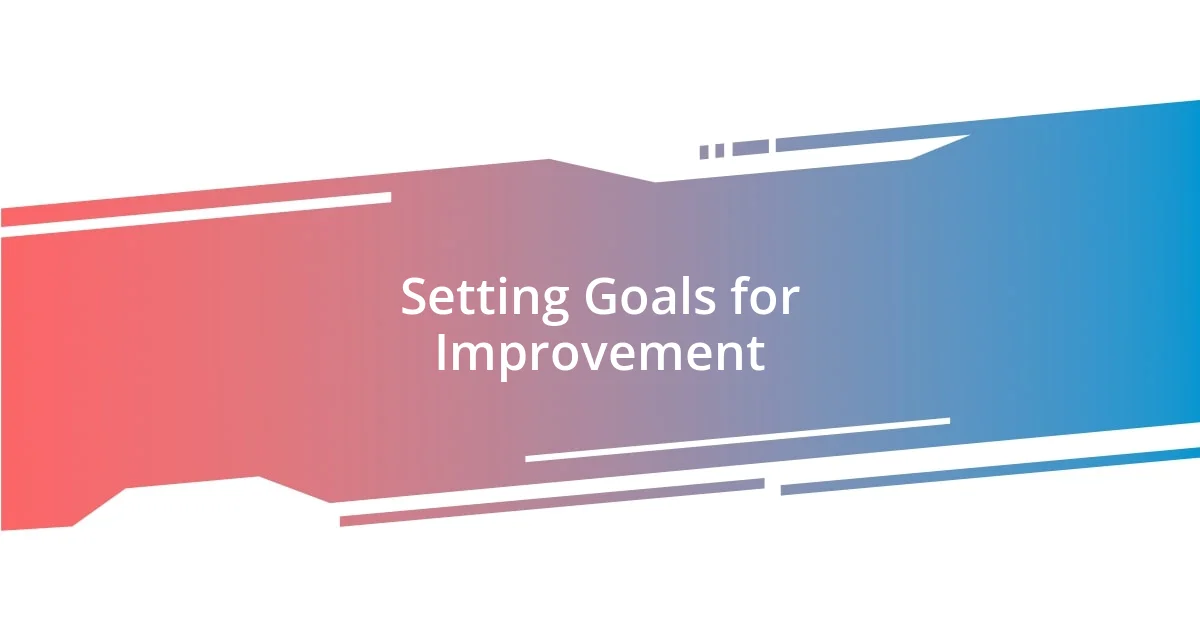
Setting Goals for Improvement
Setting goals for emotional intelligence improvement is a personal endeavor that demands clarity and commitment. I remember when I first decided to enhance my EI; I set specific objectives such as practicing active listening in conversations and appreciating differing opinions. Having tangible goals helped me stay focused, giving me a clear direction on what skills to develop and measure.
In my journey, I found that breaking down larger goals into smaller, manageable tasks was incredibly helpful. For instance, I started with a simple goal: to engage in at least one meaningful conversation each day. This simple target not only kept my commitment but also reinforced my skills regularly. Tracking my progress over time revealed gradual but impactful shifts in my emotional responses and interactions.
Lastly, I learned that it’s crucial to revisit and adjust my goals periodically. I recall a phase where I aimed for perfection in emotional responses—only to realize that embracing imperfection was more beneficial. Setting evolving goals ensured my journey remained flexible, allowing me to adapt to new challenges and insights continually.
| Goals | Strategies |
|---|---|
| Practice Active Listening | Engage in dialogues, focusing entirely on the speaker without interruptions. |
| Manage Stress | Incorporate mindfulness exercises like deep breathing for real-time emotional regulation. |
| Enhance Empathy | Volunteer or participate in community outreach to understand diverse perspectives. |
| Improve Conflict Resolution | Role-play scenarios to handle disagreements with calmness and respect. |
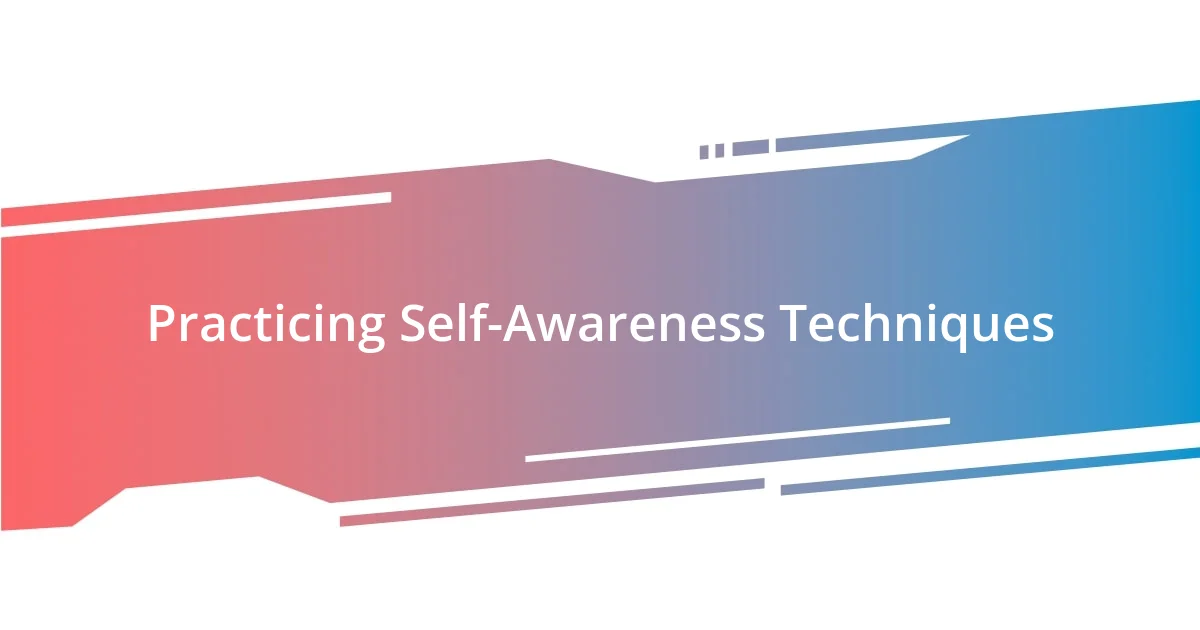
Practicing Self-Awareness Techniques
Successfully practicing self-awareness techniques transformed how I perceive my emotions. One approach that really resonated with me was meditation. In the beginning, I struggled to quiet my mind, but gradually, I found that focusing on my breath allowed me to observe my thoughts and feelings without judgment. I remember the first time I noticed a feeling of anxiety rising within me; instead of reacting impulsively, I simply acknowledged it and let it pass like a cloud in the sky. Has anyone else experienced that moment when you realize you’re more than just your emotions?
Journaling became another vital tool in my self-awareness journey. By writing about my daily experiences and emotional reactions, I uncovered deeper insights into my thought patterns. I would ask myself questions like, “What triggered my anger during that conversation?” or “Why did I feel so elated yesterday?” This self-inquiry pushed me to reflect not just on my reactions but on the underlying beliefs and assumptions driving those emotions. I often found it surprising how one small incident could ripple out and affect my entire day.
Another technique that I embraced is seeking constructive feedback from close friends. I can still vividly recall that sit-down conversation with my best friend, who candidly shared how my frustration sometimes came off as dismissiveness. It was such an eye-opener! Instead of feeling defensive, I realized that I needed to practice active listening to truly connect with others. Engaging in those conversations not only enriched my self-awareness but also deepened my relationships. Who knew that growth could spark from honest dialogue?
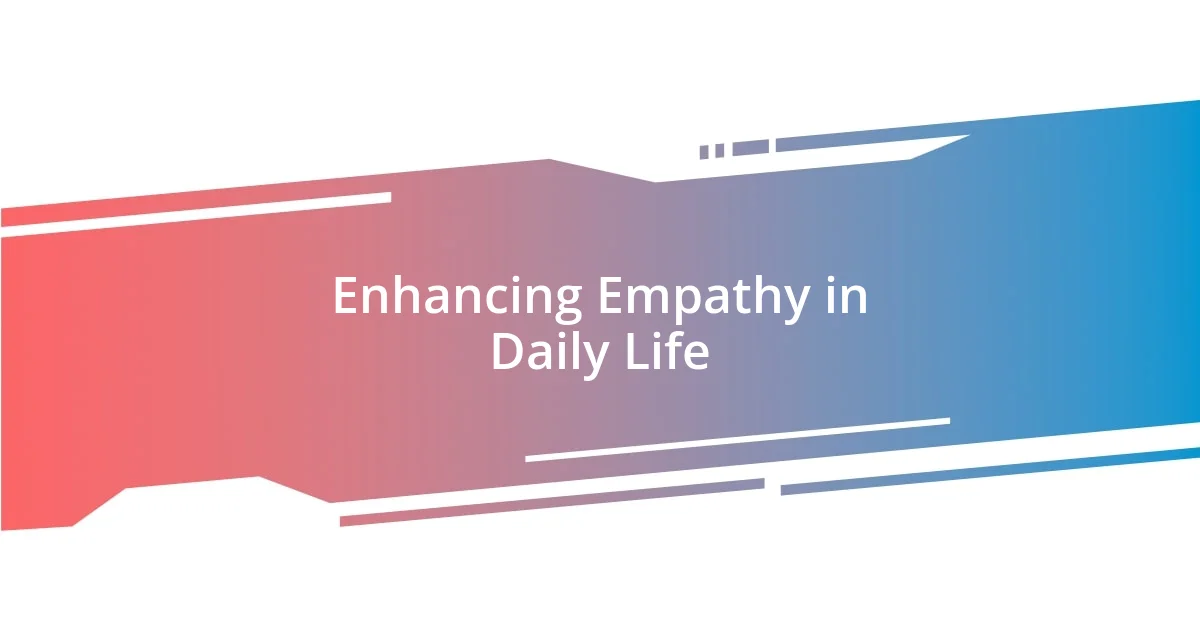
Enhancing Empathy in Daily Life
Enhancing empathy in daily life can sometimes feel like an ongoing challenge, but I’ve found that small, intentional practices make a significant difference. One day, while waiting in line at the grocery store, I noticed how impatient the person behind me was becoming. Instead of dismissing their frustration, I turned around and offered a light-hearted comment about the long wait. Their expression softened, and we ended up chatting for a moment. This little exchange reminded me of the power of simple gestures. Have you ever experienced a moment where a small act of understanding shifted the mood around you?
I also make it a point to immerse myself in diverse environments whenever possible. Volunteering at a local shelter opened my eyes to experiences I never knew existed. Listening to the stories of those we helped taught me that everyone carries their own baggage. Feeling their struggles made my own worries seem so trivial. Once, while helping someone find a job, I learned about their journey and was genuinely moved by their resilience. It sparked a realization within me: how often do we take the time to truly hear someone’s story?
Incorporating reflection into my daily routine has further deepened my empathy practice. Each evening, I take a moment to think about my interactions throughout the day. Did I genuinely listen? Was I present? I recall an instance where a co-worker expressed stress over a project. I initially brushed it off, but later realized that my response lacked warmth. Reviewing these moments helps me improve and reminds me that everyone, including myself, deserves to feel heard and understood. Has reflecting on your interactions ever prompted you to approach someone differently the next time you meet?
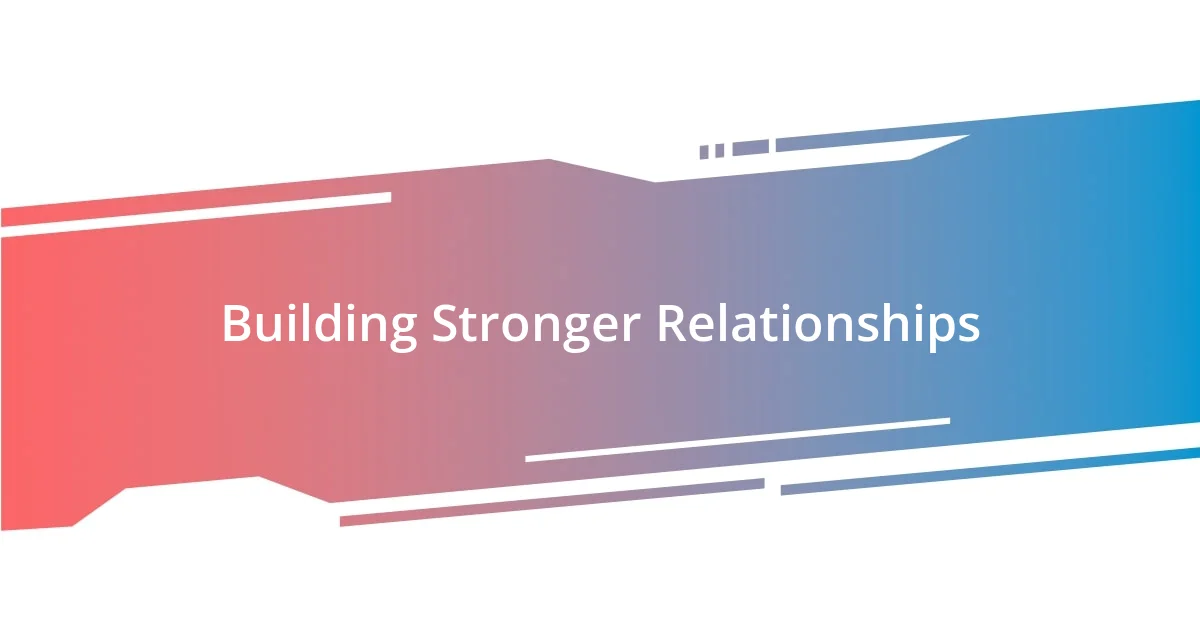
Building Stronger Relationships
Building stronger relationships often begins with the courage to be vulnerable. I’ve found that opening up about my feelings creates a genuine connection with others. For instance, during a recent coffee chat with a colleague, I shared my struggle with balancing work and personal life. To my surprise, they opened up about similar challenges, and it turned into a heartfelt conversation. Have you ever experienced a moment when sharing a vulnerability led to unexpected intimacy?
Another crucial aspect is practicing empathy in everyday exchanges. I recall a time when a friend faced a personal crisis, and instead of rushing to offer solutions, I simply listened. Their pain was palpable, and as I sat quietly, I could feel the weight of their emotions. It’s fascinating how often we rush to “fix” things instead of allowing space for someone to simply feel. Have you ever considered how being present can sometimes be the greatest support you can offer?
Lastly, establishing open lines of communication truly enhances emotional connections. I’ve started setting aside time for regular check-ins with friends and family, ensuring we touch base beyond superficial conversations. One evening, my sister and I had a deep discussion about our life choices, which lifted a veil that had been hanging over our relationship. It dawned on me: when was the last time you truly connected with someone you care about?
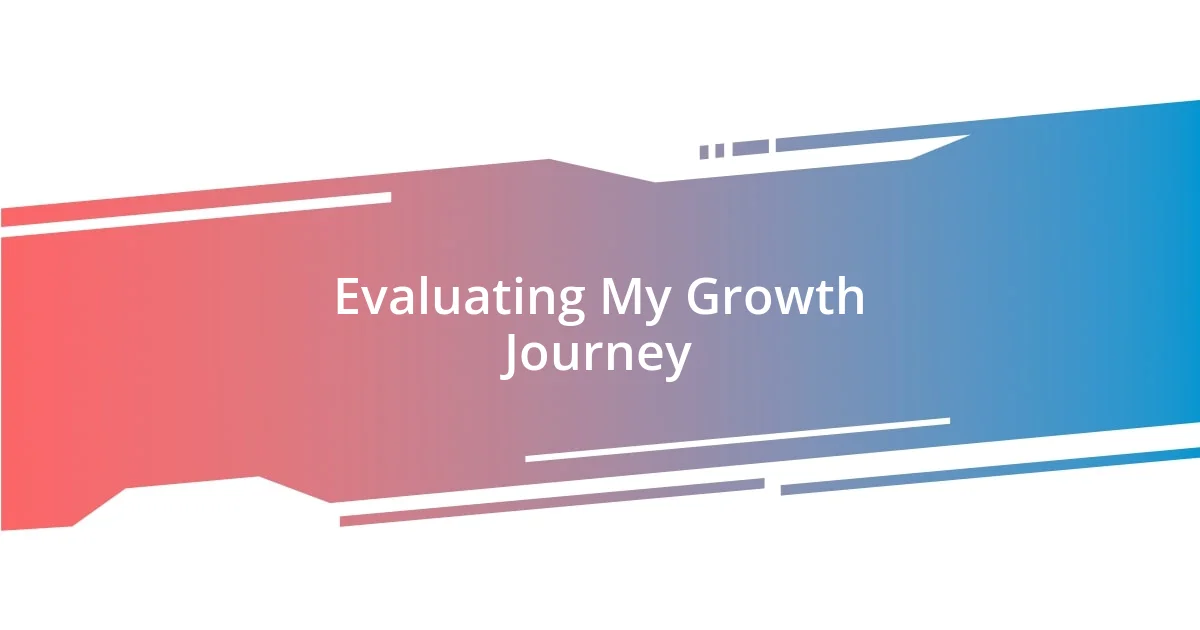
Evaluating My Growth Journey
Evaluating my growth journey, I’ve come to appreciate how self-awareness plays a crucial role. Reflecting on pivotal moments, I recall a conversation with a friend who gently pointed out my tendency to interrupt. At first, I felt defensive, but later, I realized that being receptive to feedback helps me engage more meaningfully. Have you ever found it challenging to accept constructive criticism, only to discover its value later?
Throughout this journey, I’ve noted my progress in recognizing emotional triggers. I remember vividly an incident at work when a colleague’s snide comment triggered a wave of frustration. Instead of reacting impulsively, I paused and processed my feelings. That pause empowered me to respond with empathy rather than defensiveness. It’s fascinating how mastering emotional regulation can transform our interactions, isn’t it?
Moreover, tracking my emotional responses through journaling has offered profound insights. One evening, while writing about a particularly tense family gathering, I realized that my irritation stemmed from unspoken expectations. This revelation helped me approach the next gathering with an open mind and heart. Have you ever discovered through self-reflection that your emotions might be rooted in something deeper?
